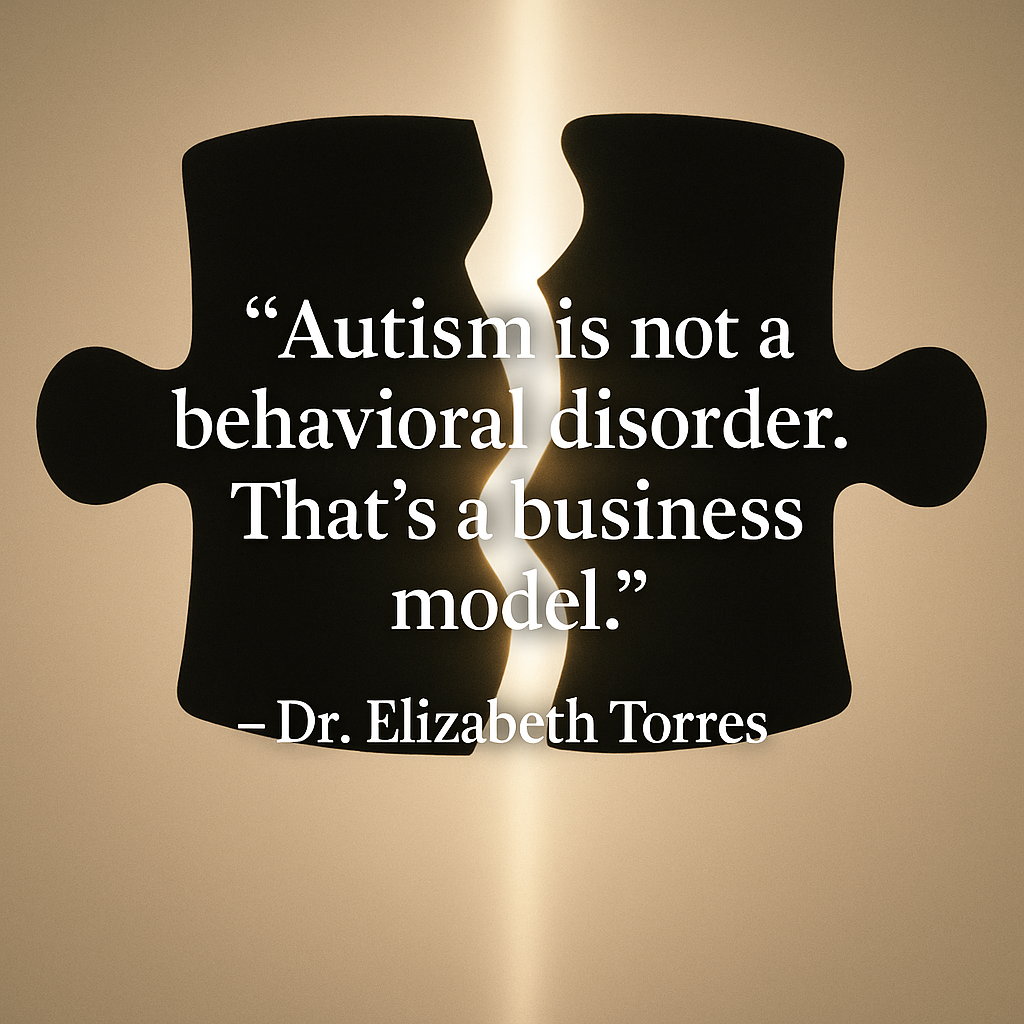When most people think of autism, they think of a diagnosis that leads to help, support, and answers.
But what if I told you the system built around that diagnosis is more about billing hours than building lives?
What if I told you the real reason autism has become so broad, so vague, and so controversial—especially in the wake of RFK Jr.’s inflammatory remarks—is because it benefits the people making money off the current model?
Let’s talk about the uncomfortable truth: the Autism Industrial Complex is real.

A Diagnosis That Opens a Pipeline
The moment a child is diagnosed with autism, a well-oiled pipeline kicks in. The dominant services that follow—Applied Behavior Analysis (ABA) and speech-language therapy—are the primary destinations.
And they’re not cheap. But more importantly—they’re not always right.
- ABA is often prescribed at 25 to 40 hours per week.
- That’s between 1,300 and 2,000 hours per year—nearly a full-time job for a child.
- Children are often pushed into speech therapy even if they can’t speak due to motor planning challenges like apraxia.
- Insurance rarely covers Spelling to Communicate (S2C), RPM, or other regulation-based, AAC approaches.
Why?
Because they’re not part of the entrenched, reimbursable framework.
What the System Rewards Isn’t Innovation. It’s Repetition.
Let’s be honest: ABA doesn’t have to prove long-term success.
It only needs to show measurable “progress” on compliance-based goals.
Therapists aren’t rewarded for breakthroughs.
They’re rewarded for how many sessions they can bill.
The result? A child can spend years in therapy that doesn’t actually support communication, regulation, or autonomy.
And the families?
They’re often told that this is the best available option.
“If it’s covered by insurance, it must be evidence-based, right?”
Not necessarily.
The real evidence is often ignored—especially when it challenges the revenue model.
The Speech Therapy Gap for Non-Speakers
Many children like my son Stone have apraxia—a motor planning disability that makes verbal speech difficult, sometimes impossible.
But the therapy offered is still speech-centric:
“Let’s try to get him to say one word.”
That may seem small, but for someone with a motor disability, it can be an act of torture.
What’s often missing is support for alternative communication methods—like spelling, AAC boards, or co-regulation strategies.
Why?
Because most SLPs aren’t trained in these methods.
And the ones who are?
They’re often forced to work outside insurance systems.
A Pipeline Fueled by Loose Diagnostics
Dr. Elizabeth Torres, a neuroscientist and fierce advocate for precision autism diagnostics, has argued that the current system is built around behavioral checklists that are wildly subjective and financially incentivized.
“You should be very wary of those clinicians who are marketing this faulty diagnosis-to-behavioral-treatment pipeline,” she wrote.
“Or you will continue perpetuating this faulty model.”
Because here’s what’s happening:
- The broader the definition of autism becomes, the more people qualify.
- The more people qualify, the more services are prescribed.
- The more services prescribed, the more hours are billable.
See the loop?
It’s not about individualized support—it’s about maximizing throughput.
What Happens When We Challenge the Model?
When families discover something different—like Spelling to Communicate or regulation-first programs—they’re often met with resistance:
“There’s not enough data.”
“That’s not evidence-based.”
Meanwhile, ABA can rack up years of therapy with no meaningful change, and no one blinks.
It’s not that all therapy is bad.
But when the financial model drives the service, we have to ask:
Is this for the child, or for the industry?
Time to Demand a Better System
We need a system that rewards:
- Precision diagnostics
- Communication access (however that looks)
- Outcomes that are child-centered—not insurance-approved
We need to stop funding interventions that train children to appear “normal” and start investing in tools that help them become autonomous.
Because the truth is: autism isn’t the problem.
The systems built around it are.
And if we don’t speak up?
We’ll keep watching hundreds of millions of dollars flow into models that do more to protect profit than potential.
Let’s build something better.
Let’s start with truth.
Let’s start by listening to those who’ve been silenced for too long.
David Kaufer is a marketing strategist, podcast host, and full-time communication partner to his non-speaking autistic son, Stone. He is the creator of The Lighter Side of the Spectrum podcast and a lifelong advocate for neurodiversity, communication access, and redefining what support actually means.
